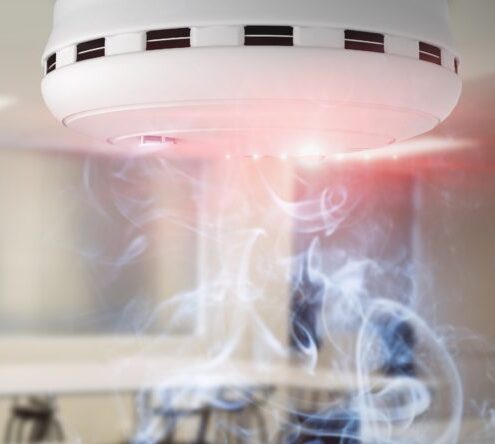Fire protection
Council takes legal action against tenants who refuse to have fire smoke detectors repaired
Four people in Kirklees, West Yorkshire, have received warrants, by the request of Kirklees Council, to enforce access to their homes in order to carry out fire safety work – will other local councils soon follow suit?
 Kirklees Council has taken legal action against three of its tenants and one private leaseholder living in flats on Brooklyn Road in Cleckheaton in order to complete repairs to smoke detectors.
Kirklees Council has taken legal action against three of its tenants and one private leaseholder living in flats on Brooklyn Road in Cleckheaton in order to complete repairs to smoke detectors.
This comes a year after the council issued a warning when housing staff revealed they were trialling whether they could file injunctions to force people to let them into their properties to carry out fire safety improvements.
Risks to life from fire, smoke and carbon monoxide are well known, with building regulations requiring that all properties built after 1 June 1992 must have a hard-wired smoke alarm installed on every floor.
More than 50 residents across the three blocks of flats were contacted to gain access to properties in order to carry out repairs. While the majority were happy to provide access, four individuals failed to engage with council staff, placing them at risk in the event of fire.
In 2020, the UK Government published ‘The Charter for Social Housing Residents’ – a social housing whitepaper that sets out reforms that will speed up the complaints procedure for residents by improving access to the Housing Ombudsum.
The charter makes landlords more accountable for the services they deliver, including access to a new information scheme for tenants of housing associations and introducing a set of tenant satisfaction measures that landlords will have to report against, this includes ensuring your home is safe and in good repair.
In November 2021, the council said it was investigating the next step, which could involve applying for an order from a judge under the Environmental Protection Act.
The council is currently in the midst of a £90m fire improvement plan, following an independent review into safety compliance. The review highlighted “significant risk” around asbestos safety and water hygiene, with fire safety flagged as the “primary risk” facing authority.
Cabinet Member for Housing and Democracy, Cathy Scott, says: “Keeping our tenants safe is our number one priority, which is why we have committed £90 million to making these essential improvements.
“While the majority of tenants share our commitment to upgrading the safety of our homes, we need all tenants to play their part.
“I am pleased to see that necessary legal action was taken in this case. It is always a last resort but in this case was necessary to ensure everyone in the building remains safe.”
In 2017, Havering Council received backing from Barkingside Magistrates Court for the first time, to force entry to properties where Gas Safety Certificates have not been produced.
Deputy Leader, Havering Council and Cabinet Member for Housing, Councillor Damian White, said: “These measures are to make sure the gas appliances are safe for residents involved and their neighbours and we are not prepared to compromise on this.
“Having to apply for these warrants has meant extra expense for those tenants as Court costs will be added to their rent accounts.”
He continued: “It is far better if access is given when a gas safety check is due to avoid such costs or forced entry in the future.”
In Scotland, a new fire and smoke alarm standard has been introduced this month which means that all Scottish homes will now need to have interlinked alarms. This means that, if one alarm goes off, they all go off, so you will always hear an alarm wherever you are in the house.
The most rigorous standards had previously only applied to new-build and privately rented housing. Now, the legislation applies to all property owners, including those who own private homes.
It is the property owner’s responsibility to meet the new standard.
Homes in Scotland must now have:
- One smoke alarm in the living room or the room you use most
- One smoke alarm in every hallway or landing
- One heat alarm in the kitchen
Any costs are the responsibility of the homeowners or landlords and depend on what you currently have in place and the alarms you choose to install.
In this case, The Scottish Government has said that there would be no penalties for non-compliance, and no-one would be penalised if they needed more time to install the alarms.
It will not be a criminal offence to not have the alarms fitted. Local authorities are officially responsible for enforcing the legislation, but they will not be going into peoples’ homes to inspect them and will not be issuing any fines.
The Scottish government said councils could require homeowners to carry out work, but do not expect them to go beyond advising property owners about fire alarms.
Council takes legal action against tenants who refuse to have fire smoke detectors repaired
Four people have received warrants to enforce access to their homes in order to carry out fire safety work – will other local councils soon follow suit?
Chrissie Joslin
SHP - Health and Safety News, Legislation, PPE, CPD and Resources Related Topics
Legal insight: Common errors in fire safety
Tall Buildings High Rise Construction Fire Safety Conference call for papers
Lithium-ion battery fire risks – What you need to know (part three)


The councils should be commended for taking prove active steps instead of waiting for a serious fire/ gas incident in their area.
I did not realise that there were no penalties for non-compliance with the new Scottish legislation for fire detection. It does seem strange!!